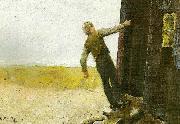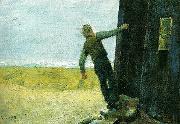Wholesale Oil Painting No Minimum |
|||||||||||
|
|
|||||||||||

|
|||||||||||
|
|
|
||||||||
Christian Krohg1852-1925 Norwegian Christian Krohg Gallery Krohg was educated in Germany at the Baden School of Art in Karlsruhe under Hans Gude[1], and later worked in Paris from 1881 to 1882. Inspired by the thoughts of the realists he chose motives primarily from everyday life ?C often its darker or socially inferior sides. Particularly well known are his pictures of prostitutes, and his novel Albertine from 1886 is about this theme. The book caused a scandal when first published, and was confiscated by the police. Krogh??s powerful and straightforward style made him one of the leading figures in the transition from romanticism to naturalism, characteristic of Norwegian art in this period. Through his periodic residence at Skagen, where he arrived for the first time in 1879, he had great influence on Anna and Michael Ancher, and provided early support to Edvard Munch. Krohg was a journalist in the Oslo newspaper Verdens Gang 1890-1910, where he wrote remarkable portrait interviews. Later he became a professor director at Statens Kunstakademi (The Norwegian Academy of Arts) 1909-1925. He was married to Oda Krohg. |
||||||||
|
|
||||||||
et nodskud
et nodskud Painting ID:: 64532 |
se se |
|||||||
|
|
||||||||
Christian Krohg1852-1925 Norwegian Christian Krohg Gallery Krohg was educated in Germany at the Baden School of Art in Karlsruhe under Hans Gude[1], and later worked in Paris from 1881 to 1882. Inspired by the thoughts of the realists he chose motives primarily from everyday life ?C often its darker or socially inferior sides. Particularly well known are his pictures of prostitutes, and his novel Albertine from 1886 is about this theme. The book caused a scandal when first published, and was confiscated by the police. Krogh??s powerful and straightforward style made him one of the leading figures in the transition from romanticism to naturalism, characteristic of Norwegian art in this period. Through his periodic residence at Skagen, where he arrived for the first time in 1879, he had great influence on Anna and Michael Ancher, and provided early support to Edvard Munch. Krohg was a journalist in the Oslo newspaper Verdens Gang 1890-1910, where he wrote remarkable portrait interviews. Later he became a professor director at Statens Kunstakademi (The Norwegian Academy of Arts) 1909-1925. He was married to Oda Krohg. |
||||||||
|
|
||||||||
|
|
et nodskud
et nodskud Painting ID:: 64625 |
1887
se 1887 se |
||||||
|
|
||||||||
|
Christian Krohg 1852-1925 Norwegian Christian Krohg Gallery Krohg was educated in Germany at the Baden School of Art in Karlsruhe under Hans Gude[1], and later worked in Paris from 1881 to 1882. Inspired by the thoughts of the realists he chose motives primarily from everyday life ?C often its darker or socially inferior sides. Particularly well known are his pictures of prostitutes, and his novel Albertine from 1886 is about this theme. The book caused a scandal when first published, and was confiscated by the police. Krogh??s powerful and straightforward style made him one of the leading figures in the transition from romanticism to naturalism, characteristic of Norwegian art in this period. Through his periodic residence at Skagen, where he arrived for the first time in 1879, he had great influence on Anna and Michael Ancher, and provided early support to Edvard Munch. Krohg was a journalist in the Oslo newspaper Verdens Gang 1890-1910, where he wrote remarkable portrait interviews. Later he became a professor director at Statens Kunstakademi (The Norwegian Academy of Arts) 1909-1925. He was married to Oda Krohg. et nodskud 1887 se |
||||||||
|
|
||||||||
|
Prev Next
|
||||||||
|
|
||||||||
|
Related Paintings to Christian Krohg :. |
||||||||
|
|
||||||||
|
CONTACT US |


